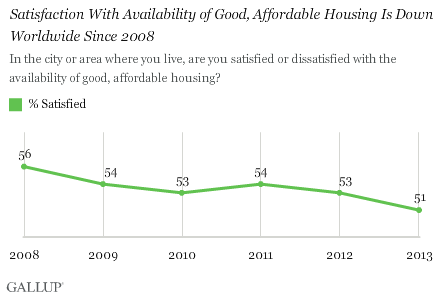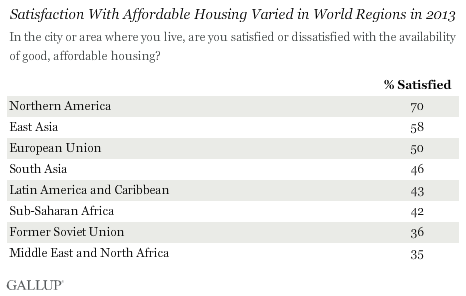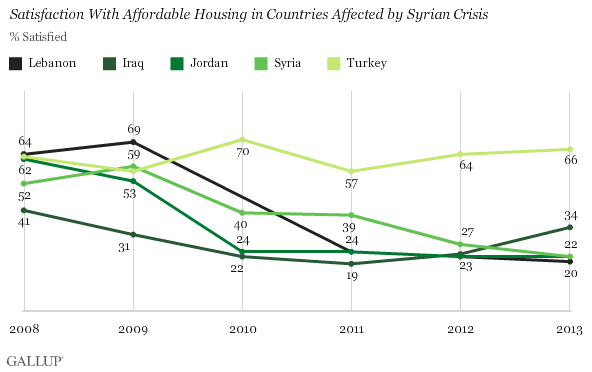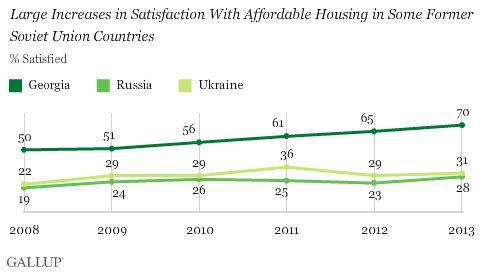Story Highlights
- Globally, 51% satisfied with availability of affordable housing
- Satisfaction fell in Middle East and North Africa conflict zones
- Satisfaction in former Soviet Union up slightly since 2008
WASHINGTON, D.C. -- Globally, people's satisfaction with the availability of good, affordable housing in their communities continued to languish in 2013. The 51% of adults who were satisfied worldwide remains depressed from the high of 56% at the onset of the Great Recession in 2008 and is on the low side for satisfaction since then.

Satisfaction also continued to vary worldwide in 2013, ranging from a high of 70% in Northern America to lows of 36% and 35% in the former Soviet Union and the Middle East and North Africa region, respectively.

This wide gap in satisfaction levels highlights the different tracks that the world's housing markets are on and the struggles people in many countries are experiencing trying to afford increasing rent and home prices. The International Monetary Fund found that housing prices peaked in late 2008, but have since begun climbing back up. The satisfaction gap also underscores the challenge the global community faces in meeting one of the United Nations' new Sustainable Development Goals of ensuring "access for all to adequate, safe and affordable housing" by 2030.
This challenge is particularly acute in the Middle East and North Africa region, where barely more than one in three (35%) are satisfied with the availability of good, affordable housing. Satisfaction in many countries started to drop as unrest began to ripple across the region in late 2010 during the Arab Spring and likely has been exacerbated in some countries by the ongoing Syrian crisis.
Since the crisis began in Syria in 2011, the U.N. estimates that almost half of the population of the country, or about 11 million, has been forced to leave their homes. Almost 3 million have left the country altogether, most fleeing to neighboring nations such as Turkey, Lebanon, Jordan and Iraq.

Satisfaction in Lebanon, Jordan, Iraq and Syria remains much lower now than levels seen in 2008 and 2009. Particularly, satisfaction in Lebanon dropped from 69% in 2009 to 24% in 2011. A recent report estimates that Lebanon, a small nation where housing and land prices were already at a premium before the Syrian crisis, has received about a third of the refugees from Syria, or more than 1 million people. Rent has increased in some Lebanese cities, especially in Beirut, as a result of the influx of Syrian refugees, and many newly constructed apartments remain unsold because residents cannot afford them.
Housing Satisfaction Slowly Rising in Former Soviet Union
Satisfaction with the availability of good, affordable housing also remains low in many countries in the former Soviet Union, but it is higher than it was five years ago in several countries. Residents of Georgia currently have the highest satisfaction (70%) in the region, on par with satisfaction levels in the U.S. (71%) in 2013. The increase from 50% in 2008 could be the result of increased foreign investment and comparatively favorable construction laws in Georgia.

Satisfaction with available housing in Russia and Ukraine remains low in both countries; however, in both countries, levels are higher than in 2008. Satisfaction in Ukraine rose as high as 36% in 2011, but sank back to 31% in 2013. This is still higher than the 22% satisfied in 2008.The 28% satisfied in Russia in 2013 is one of the highest levels seen since 2008, when 19% of Russians were satisfied. This increase in satisfaction levels may reflect Russia's slowing housing market after years of overheated prices.
Satisfaction, although improved, might remain low in Russia as a result of the Soviet government distributing wealthy residents' homes among poorer families in the 1920s, generally putting one family per room. While this communal housing program eventually faded, in some parts of Russia, it is still common, complicating moving and families' ability to find affordable housing.
Bottom Line
Although housing prices vary greatly worldwide, providing and affording shelter is a necessity in all countries, which is why it has a place in the U.N. post-2015 development agenda. However, a lack of affordable housing continues to plague many nations, highlighting the need for new construction and for home prices to match local wages. The IMF recently warned that in 2014, housing prices are still above historical averages in a majority of countries, highlighting that the struggle to finding affordable homes could continue for many around the world. Finding available, affordable housing still appears to be a challenge for many worldwide following the Great Recession, and conflict in some areas has made already bad situations worse.
The data in this article were generated from Gallup Analytics. For complete data sets or custom research from the more than 150 countries Gallup continually surveys, please contact us.
Survey Methods
Results are based on telephone and face-to-face interviews with approximately 1,000 adults in each country, aged 15 and older, conducted from 2008 to 2013. For results based on the total sample of national adults, the margin of sampling error ranges from ±2.1 percentage points to ±5.6 percentage points at the 95% confidence level.
For more complete methodology and specific survey dates, please review Gallup's Country Data Set details.
Learn more about how the Gallup World Poll works.

